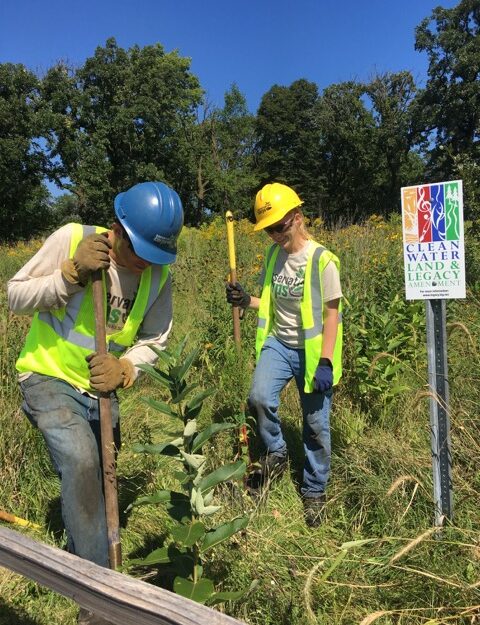Urban Rain Gardening

By: Rose Lundy

I have never been much of a gardener. My mom would work tirelessly out in our tiny city backyard, pulling creeping charlie, meticulously planting flowers and propping up plants with metal cages. I used to help her with as much interest as I showed doing any other necessary, but dull tasks, such as laundry or vacuuming. Then I started working with Conservation Corps, and suddenly most of my days were filled with gardening tasks: weeding, planting, trimming, composting. And somewhere along the way I gained a new appreciation for such intricate work.
I have learned this summer just how valuable rain gardens are to urban conservation. When I think of conservation, I often picture remote parks that are nearly untouched by modernizing forces, where dedicated environmentalists spend their lives preserving the wilderness. However, urban conservation is quite a bit different than this image. When there are a lot of people living in one place, chemicals and pollution are naturally going to move around, especially when it rains. In a city, there often is a lot of concrete, so there are fewer places for rain to be absorbed into the ground. As a result, the rainwater flows over roads and into storm drains, gathers pollution and sediment, and collects somewhere like Como Lake.
However, if we have multiple small rain gardens along that path, the runoff has somewhere to dump the soil and join the groundwater. Rain gardens are often situated in a slight basin so that when it rains, the water gathers there and is drawn into the ground. Native plants absorb chemicals in the runoff, extracting the pollutants out of the water. This absorbs runoff, prevents pollution movement and helps refresh groundwater.
Rain gardens are a wonderful, natural solution to a common problem in the city. But they do take a lot of maintenance. It is necessary to constantly remove invasive species and trim overgrown parts. My crew often returns to the same rain gardens to clear soil from the outlets, remove weeds and shovel out sediment. The reality is that these projects are never finished — we will never be able to cross it off on a to-do list and move on forever. Future crews will probably have to return to the same locations to take care of the work that crews started years before them. And yet, the benefits make all the effort worthwhile.
Maybe I will never learn to love gardening in my own backyard, but I now understand a garden’s crucial role in an urban environment.
